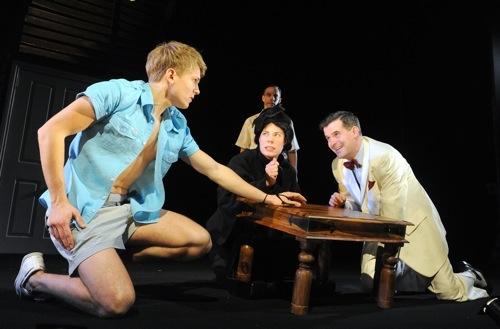The spinning roulette wheel, the revolver, the devil’s mask, and above all that lissom semi-naked female gyrating in silhouette against flickering infernal flames: we all remember the opening titles to Tales of the Unexpected, which made its first TV appearance in 1979. Anyone who has also read the stories that spawned the series can vouch for their sublime slipperiness, the wicked, cackling glee that rattles through their understated prose, their winkling out of the awful and the uncanny in what appear socially ordinary situations.
Now, in a follow-up to last year’s hit show Ghost Stories – which transferred to the West End and continues to do a brisk business with chill-seekers – the Lyric brings us a new adaptation of a handful of Dahl’s stories. Jeremy Dyson, member of acclaimed pitch-black comic ensemble the League of Gentlemen, was co-creator and director of Ghost Stories; this time, he’s solely responsible for the adaptation, while the staging is the work of Polly Findlay. Disappointingly, the results are bloodless. Almost every subtlety, every gradual, creeping accumulation of tension summoned by Dahl’s writing is swept aside here by easy laughs. There’s scarcely a single moment to set the scalp deliciously prickling.
The setting is very much Fifties England: a world of bowler hats and pinstripes, vicious public-school bullies, stifling marriages and mind-numbing jobs
There is still some evidence of ingenuity. Not content with just a single neat framing device, Dyson offers two, one slotted cleverly inside the other. The effect is that of a self-reflexive mirror. On a train, a small boy in short trousers reads a story about a set of commuters, who in turn find themselves pestered by a vulgar newcomer to their carriage who insists, every morning, on regaling them with outlandish tales of his own. The setting, designed by Naomi Wilkinson, is very much the Fifties England in which Dahl – with his personal experience of the brutalities of private education and Second World War combat – was writing: a world of bowler hats and pinstripes, vicious public-school bullies, stifling marriages and mind-numbing jobs; a world which awoke to headlines – as seen here emblazoned on the front page of the travellers' newspapers – about the US testing the nuclear bomb. Violence and uncertainty lurk beneath established routines, morality and manners.
 But having established that environment, FIndlay fails to capitalise on it. Instead, her production sends up the period detail, presenting it as something quaint and laughable. William and Mary, one of the most famous stories – in which a medical experiment sees a hectoring husband helplessly preserved beyond death as just a living, conscious brain and a lone watchful eye, to the delight of his once cowed, newly liberated wife – is, like much else here, cluttered with mannerism and cut-glass vowels. Similarly, the homely poisoner in The Landlady is immediately much too grotesque to allow for suspense, while the sadistic trickster in Man from the South boasts a needlessly overblown comedy Spanish accent.
But having established that environment, FIndlay fails to capitalise on it. Instead, her production sends up the period detail, presenting it as something quaint and laughable. William and Mary, one of the most famous stories – in which a medical experiment sees a hectoring husband helplessly preserved beyond death as just a living, conscious brain and a lone watchful eye, to the delight of his once cowed, newly liberated wife – is, like much else here, cluttered with mannerism and cut-glass vowels. Similarly, the homely poisoner in The Landlady is immediately much too grotesque to allow for suspense, while the sadistic trickster in Man from the South boasts a needlessly overblown comedy Spanish accent.
There is unquestionably wicked humour in Dahl’s tales, as currently seen to great effect in the RSC's triumphant production of Matilda; but here it is overplayed, at the expense of any really troubling sense of the uneasy or macabre. The exception is Galloping Foxley, a story of horrifying cruelty at a boarding school inflicted by a prefect on his hapless young fag (George Rainsford and Jonathan Danciger, pictured right). It is this story that supplies the commuter motif – the younger boy, now a grown-up, besuited office drone, believes he has recognised his tormentor on his daily journey to work – and it also provides the show with a climax that is considerably more involving and affecting than anything that precedes it. But it’s too little, too late. Dahl’s tales remain tourniquet-tight and irresistibly compelling. Findlay, though, never pushes us nearly close enough to the edge of our seat.
- Roald Dahl’s Twisted Tales at the Lyric Hammersmith theatre, London until 26 February
- Find Roald Dahl on Amazon
- Find Tales of the Unexpected on Amazon















Add comment